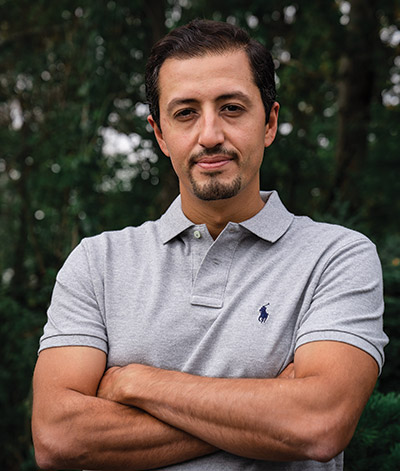Many have tried to adapt the exacting precision and consistency of factory-floor robots to construction sites and work zones, but there are always compromises and problems. Some roboticists and technologists might get frustrated by these seemingly endless setbacks, but Ali Asmari relishes the challenge.
他说:“我真正充满热情的是将机器人技术的能力从受控环境带到真实的环境中。”这个目标一直是阿斯马里(Asmari)在ULC Technologies工作的推动力,他率先努力建立一个自主机器人,该机器人可以在道路下扫描和定位公用事业,然后用最少的人类投入进行挖掘,维修和重新烘烤,修理和重新驾驶。
Related Article:
道路工具机器人自主挖掘,维修埋藏的公用事业线路
Back to:
25名顶级新闻记者
The result of this work is the Robotic Roadworks and Excavation System, or RRES, which underwent successful trials with U.K.-based gas utility SGN last year. With a fully articulated robotic arm on a battery-powered platform, the RRES can perform gas line repairs beneath a paved road with only a couple of technicians keeping an eye on it as it goes through the necessary steps. Working through a keyhole cut in the pavement with only a single lane of traffic disruption, the RRES condenses down an operation that would normally take a small crew of workers.
“We’re talking potentially taking things that took three to four days instead only taking three to four hours,” says Ollie Machan, SGN project lead for the RRES effort. “Particularly in London and other metro areas, it’s potentially a big benefit to get things done.”

处理的崎岖的条件建设jobsites and road repairs was not Asmari’s initial career goal. Originally from Iran, Asmari came to the U.S. in 2010 for graduate studies in robotics. After a Ph.D. thesis on computer vision and AI, Asmari worked at several robotics firms before landing at ULC in 2018. He says he was drawn to the challenges of building robots that could orient themselves and work in a chaotic environment like construction. “Designing and testing everything in the lab is cool and fun, but once you deploy to the field, that’s 50% of the work.”
尽管他期望从建筑和公用事业到RRES等高科技方法,但阿斯马里表示,该行业似乎已经准备好进行革命,以实现其做事。他说:“在许多情况下,我将这些设备,这些新技术(对公用事业和承包商)进行了,这些人认为这是不费吹灰之力的。”成本始终是复杂的机器人的问题,但是业内许多人认为将设备操作员从驾驶室或建筑工人拿出泥泞的沟槽中带出的安全益处。Asmari说:“我个人认为自动解决方案的推出不是一夜之间的事情。”“将面临挑战和失败。但是我们从发展的每个步骤中学习。”
Since the successful trials last year, RRES has continued to find fans among utilities in the U.S. and Europe. Asmari has since moved up to director of automation at ULC Technologies, and is taking a broader look at how automation can improve construction and maintenance of infrastructure.


